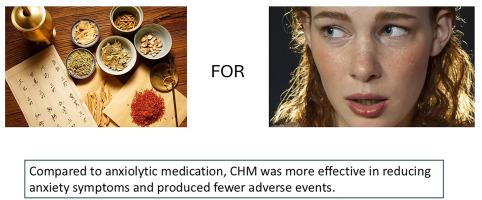Chinese herbal medicine for anxiety disorders and obsessive-compulsive disorder: A systematic review with meta-analysis
IF 3.2
2区 医学
Q1 PSYCHIATRY
引用次数: 0
Abstract
The objective of this systematic review is to assess the effectiveness and safety of Chinese Herbal Medicine (CHM) for anxiety disorders and obsessive-compulsive disorder (OCD). EMBase, PubMed, CINAHL, CNKI, Wanfang, CQVIP, clinicaltrials.gov and Chinese Clinical Trial Registry were searched from database inception to January 2025 using search terms defining “anxiety/OCD”, “Chinese herbal medicine” and “randomized controlled trial”. From a total of 9805 reports screened, 92 randomised-controlled trials in which CHM was tested against anxiolytics in the treatment of anxiety disorders and OCD were included in the review. The sample size, mean and standard deviation at end-of-intervention (for continuous outcomes) and number of participants who experienced adverse events were collected for each arm. Compared to anxiolytic medication, CHM was more effective in reducing anxiety (Hamilton Anxiety Rating Scale Mean Difference = −1.50 points, 95 % CI -2.21 to −0.78, p < 0.001) and produced fewer adverse events (Incidence Rate Ratio = 0.33, 95 % CI 0.24 to 0.45, p < 0.001) in participants with generalised anxiety disorder. These results are supported by studies with a low risk of bias. No study with a low risk of bias tested CHM for panic disorders and OCD. This systematic review indicates a favourable risk/benefit profile of CHM compared with anxiolytic medication for GAD, and therefore CHM could be considered as an alternative to anxiolytics. Studies with a low risk of bias are required to assess the effectiveness of CHM for panic disorders, phobic disorders and OCD.

中药治疗焦虑障碍和强迫症:荟萃分析的系统综述
本系统综述的目的是评估中药(CHM)治疗焦虑症和强迫症(OCD)的有效性和安全性。检索词为“焦虑/强迫症”、“中草药”和“随机对照试验”,检索自数据库建立至2025年1月的EMBase、PubMed、CINAHL、CNKI、万方、CQVIP、clinicaltrials.gov和Chinese Clinical Trial Registry。从筛选的9805份报告中,本综述纳入了92项随机对照试验,在这些试验中,中西医结合治疗焦虑障碍和强迫症的抗焦虑药物被测试。收集每个组的样本量、干预结束时的平均值和标准差(连续结果)以及经历不良事件的参与者人数。与抗焦虑药物相比,CHM在减少焦虑方面更有效(汉密尔顿焦虑评定量表平均差= - 1.50分,95% CI -2.21至- 0.78,p < 0.001),并且在广泛性焦虑障碍参与者中产生更少的不良事件(发病率比= 0.33,95% CI 0.24至0.45,p < 0.001)。这些结果得到了低偏倚风险研究的支持。没有低偏倚风险的研究检验CHM治疗惊恐障碍和强迫症。该系统综述表明,与抗焦虑药物相比,中草药具有良好的风险/益处,因此可以将中草药视为抗焦虑药物的替代品。需要低偏倚风险的研究来评估中西医结合治疗惊恐障碍、恐惧障碍和强迫症的有效性。
本文章由计算机程序翻译,如有差异,请以英文原文为准。
求助全文
约1分钟内获得全文
求助全文
来源期刊

Journal of psychiatric research
医学-精神病学
CiteScore
7.30
自引率
2.10%
发文量
622
审稿时长
130 days
期刊介绍:
Founded in 1961 to report on the latest work in psychiatry and cognate disciplines, the Journal of Psychiatric Research is dedicated to innovative and timely studies of four important areas of research:
(1) clinical studies of all disciplines relating to psychiatric illness, as well as normal human behaviour, including biochemical, physiological, genetic, environmental, social, psychological and epidemiological factors;
(2) basic studies pertaining to psychiatry in such fields as neuropsychopharmacology, neuroendocrinology, electrophysiology, genetics, experimental psychology and epidemiology;
(3) the growing application of clinical laboratory techniques in psychiatry, including imagery and spectroscopy of the brain, molecular biology and computer sciences;
 求助内容:
求助内容: 应助结果提醒方式:
应助结果提醒方式:


